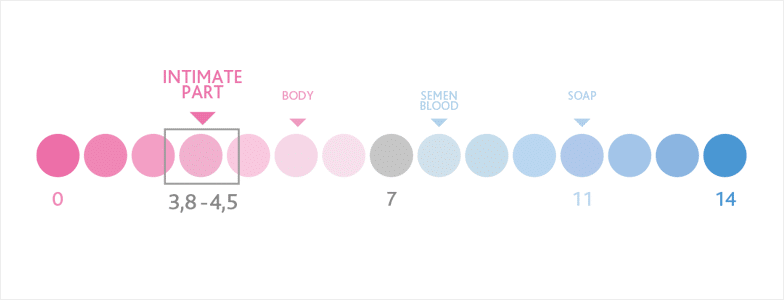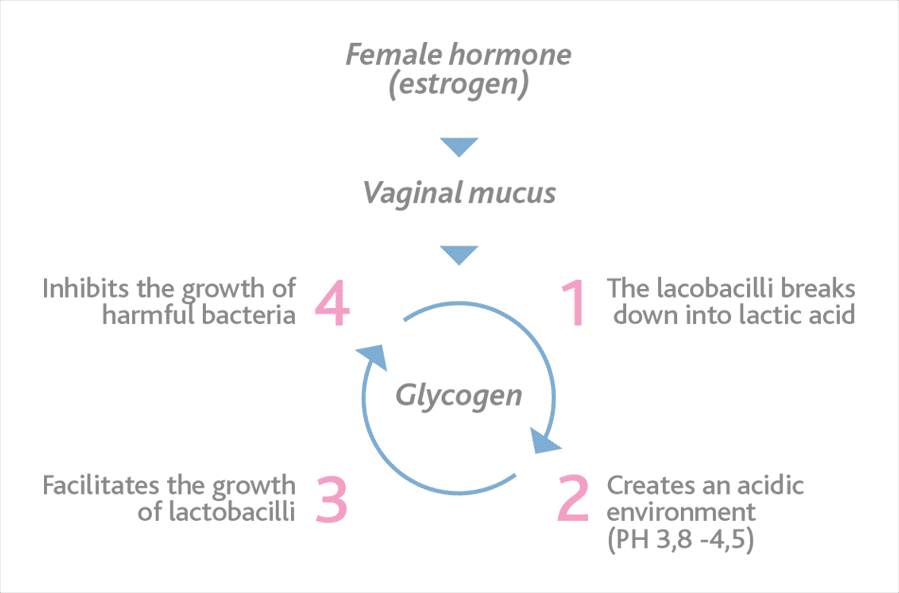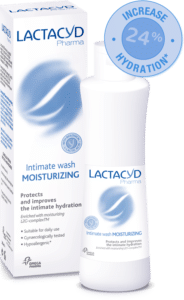The vagina has a natural protective layer that acts as a defense mechanism against pathogens and infection. This protective layer is acidic in nature, which means that the vaginal pH fluctuates between 3.8 to 4.5.
Simple tips for a happy V
Learn how to prevent infection and promote intimate comfort
Understanding pH and lactic acid

A low pH creates balance between
good and bad bacteria
Lactobacilli are some of the main bacteria responsible for maintaining a healthy vaginal flora. Their production of lactic acid contributes to a healthy acidity of the vaginal environment.
A natural acidity is important, because bacteria that cause diseases don’t grow well and can’t reproduce easily in an acidic environment.
How it works?

Lactobacilli break down glycogen contained in the vaginal mucus. Lactic acid is then produced, and an acidic environment is formed. This acidic environment promotes the growth of more lactobacilli, inhibiting the presence of harmful bacteria and preventing infection. Your vagina takes care of itself as its walls continually produce secretions to provide lubrication, self-cleanse, and maintain the proper acidity to prevent infection.
Lactic acid is vital in protecting your intimate zone. By keeping the pH in the vagina low, it maintains the vagina’s acidic protective layer.
 That’s why you find lactic acid and other natural ingredients in all Lactacyd products.
That’s why you find lactic acid and other natural ingredients in all Lactacyd products.
Conditions in the human vagina vary during different life stages (menstrual cycle, pregnancy, menopause) and other daily activities. As conditions change, the natural balance of the bacteria also changes, which can lead to discomfort, irritation, and even infection.
Factors of inbalance
Many factors can disturb the natural balanced protective flora of the vaginal area, and if the disturbance is too great, these flora can no longer adapt, which may result in discomfort or vaginal infections. Factors that can affect the natural balance include:
Experiencing discomforts or special moments
Learn more about the discomforts you might experience due to the factors mentioned here above.
Intimate questions
Some frequently asked questions regarding your intimate zone

Why is washing with water not enough?
Many women wash their intimate zone with water alone. Water has a cleansing effect but does not protect the natural balance of the intimate zone. Compare it to the rest of your skin – you wouldn’t cleanse, nurture, and protect it with just water, would you?
By using Lactacyd, you help to protect the balance of your intimate zone while also cleansing and refreshing.
Why are regular soaps not recommended?
Regular soaps are often alkaline, and have a pH higher than the natural pH of the intimate zone. Therefore, soaps can disrupt the natural balance of your intimate zone by decreasing your natural protection and making you more vulnerable to problems and irritations. Soap can also harm or weaken the protective biofilm.
All Lactacyd products are soap-free and have an adapted pH to match that of your intimate zone.
What does vaginal pH balance mean?
The healthy vagina contains both good and bad bacteria. Normally, the good bacteria predominate and they keep the vaginal pH between 3.8 to 4.5 (slightly acidic). But sometimes women go through changes that can cause the bad bacteria to overgrow. When this happens, the bad bacteria proliferate and a vaginal infection may occur. Bacterial vaginosis (BV) and yeast infections (Candida) are the most common of these. With BV, the vaginal pH can go up to 6.0, or even higher in some cases. With yeast infections the pH does not change.
Lactacyd products are formulated with a pH of 3.5 or 5.2. The pH in Lactacyd products is maintained by the main ingredient, lactic acid, in harmony with the other components of this special formulation. This fairly low pH does not encourage the growth of the bad bacteria.















